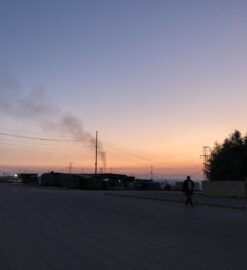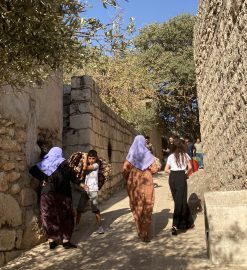The making of an Islamic State terrorist
Published: Al Monitor
LEIDEN, Netherlands — In the private video Mohamed Nidalha showed of his son, Reda, the young man is seen partying. The 19-year-old dances and raps to loud hip-hop music, while behind him, a girl dressed in a tight top cooks something in the kitchen. A bottle of liquor sits on the table. People are smoking. It is an unremarkable video, one that anyone would expect to find on a teenager’s cell phone.
In June 2014, a few weeks after the video was recorded, Reda Nidalha, a Dutch teenager of Moroccan descent, would leave for Syria to join the Islamic State (IS). He called his younger sister from Turkey and said he was in Istanbul, on his way to “help raped women and children in Syria.” When Mohamed Nidalha found out that his son was headed for Syria, he tried to stop him. He contacted the Dutch police and secret service, but they said they couldn’t do anything because there was no international arrest warrant for Reda Nidalha.
“Six weeks later, he called us again, saying he was in Syria,” Mohamed Nidalha told Al-Monitor. “He posted some pictures of himself with guns and military clothes and bragging.”
According to Mohamed Nidalha, his son had been a normal teenager, albeit a bit of a troublemaker. Reda Nidalha dated girls, drank alcohol and liked to party. He had difficulty with school, because attention deficit disorder affected his concentrate in class. He lost interest in school, but couldn’t find an internship. He began hanging out with the wrong crowd and soon got involved in a ring trafficking in drugs. After a while, he decided to quit that scene, but was unable to, because he was being extorted by criminals who said he owed them some 4,000 euros ($4,530).
The son, who was close to his father, told him, “Dad, I’m in trouble.” Mohamed Nidalha recalled, “I decided that it was better for Reda to be sent to Belgium for a while, so he could get away from all the problems and the people who were after him.” Reda Nidalha went to Belgium, where he stayed for a while with his uncle. At some point, he left his uncle’s house and moved in with a friend.
“Looking back now, this probably was a bad decision,” Mohamed Nidalha said. It is likely that his son came into contact with members of Sharia4Belgium, a radical Islamist group with lots of members who have traveled to Syria.
Mohamed Nidalha explained, “Suddenly he kept his beard, started to wear Islamic clothes and talk about religion, something he had never done before. Reda told me, ‘Look, Dad, I am going to the mosque. I am on the right path now.’ But we had no idea it was this bad. Despite becoming more interested in religion, he didn’t change his lifestyle completely, as the video shows. However, three weeks after he moved in with his friend, Reda left the country.”
Reda Nidalha, one of the estimated 5,000 Westerners who have gone to Syria or Iraq to fight on behalf of IS or Jabhat al-Nusra, is not the only example of a young man with a criminal background who suddenly radicalized. Analysts have found that jihadi terror networks such as IS often attract criminal elements, from those involved in petty crimes to organized crime. Daan Weggemans, a researcher at the Institute for Security and Global Affairs at the University of Leiden and a research fellow at the International Center for Counter-Terrorism, said that although exact numbers are not available, based on his research over the past five years, Reda Nidalha’s path might be an increasingly visible trend.
“It could be that jihad has gone more mainstream and that the step from criminality to jihad has become smaller,” Weggemans told Al-Monitor. “It is a matter of supply and demand — looking for status, fraternity, meaning, adventure, a sense of belonging. These things can be found in a criminal gang or even a cult, but also in terrorist groups.”
After the March 22 attacks in Brussels that killed at least 32 people, it soon became clear that at least two of the attackers had criminal backgrounds. The El Bakraoui brothers, who were known to Belgian police, had records for armed robbery, shooting at police officers and attempted carjacking. Some of the men responsible for the November attacks in Paris had also been involved in criminal activities, including armed robbery and drug possession. In August, Belgian authorities said that half the Belgium jihadists in Syria and Iraq had criminal records before they left home.
According to Weggemans, there are three types of motives for jihad. One is ideological, wherein radical Islam plays a huge role in answering important life questions such as Who am I? What should I do? How should I do it? Another is social, belonging to a tight, close-knit network or circle of friends who influence one another. The other involves pragmatism. “The practical motive involves things like running away from something, like debts or enemies, which are push factors. But it also may contain pull factors, like adventure, battles and status, from zero to hero,” Weggemans said, adding that one cannot detach this motive from the religious and social aspects.
Reda Nidalha appears to have wanted to escape his past, or as his father put it, to “start over with a clean slate.” Mohamed Nidalha further commented, “He was easy to influence. I still cannot believe, two years later, he is with IS. I think about it day and night.”
A former friend of Reda Nidalha who requested anonymity believes that the religious aspect probably played a lesser role in Reda Nidalha’s case. “He never bothered about religion, and he had friends from many different cultures. Even when he was already in Syria, he used to talk to me sometimes on social media. I told him I did not agree with his decision. He told me he had a job there and was married.”
The brothers Brahim and Salah Abdeslam were both involved in November’s Paris attacks. Brahim Abdeslam blew himself up in Paris, and Salah Abdeslam was arrested in Brussels just days before the March 22 attacks there. CNN acquired footage showing both men partying in a nightclub only months before they carried out the series of deadly attacks in the French capital. The video shows a side of the attackers the public had not previously seen.
Mohamed Nidalha rarely hears from his son these days. Reda Nidalha, now 21, sent his father a private message on social media expressing anger that his dad had spoken out in the media. Mohamed Nidalha struggles with having mixed feelings. On the one hand, he is angry at his son for having joined such a horrific organization, but on the other hand, he misses his son and still loves him, despite his choices.
Although one might think that young men like Reda Nidalha are only in it for the thrill, the attacks in Brussels and Paris show that they can become even more radicalized, and dangerously equipped, during stays in IS’ self-proclaimed caliphate, before being sent back to Europe with the goal of staging attacks.
Weggemans remarked, “I can imagine that when it comes to hardened criminals, who have a record of serious crime or have spent a number of years in prisons, you become emotionally toughened and more able to commit such horrible offenses.” Reda Nidalha’s father, however, thinks his son is just a naive young man who got sucked into an extremist group that preys on young men like him. “I know it is not an excuse, but it might help explain why he went there,” Mohamed Nidalha said.



Leave a Reply